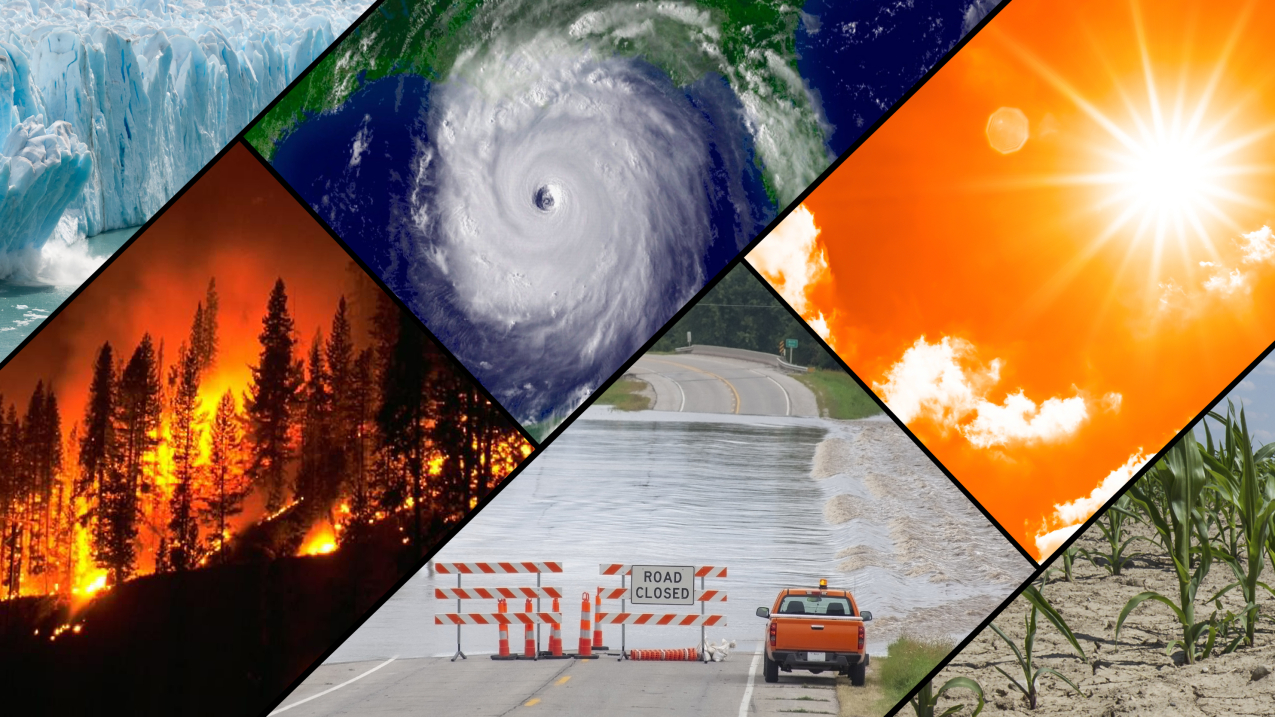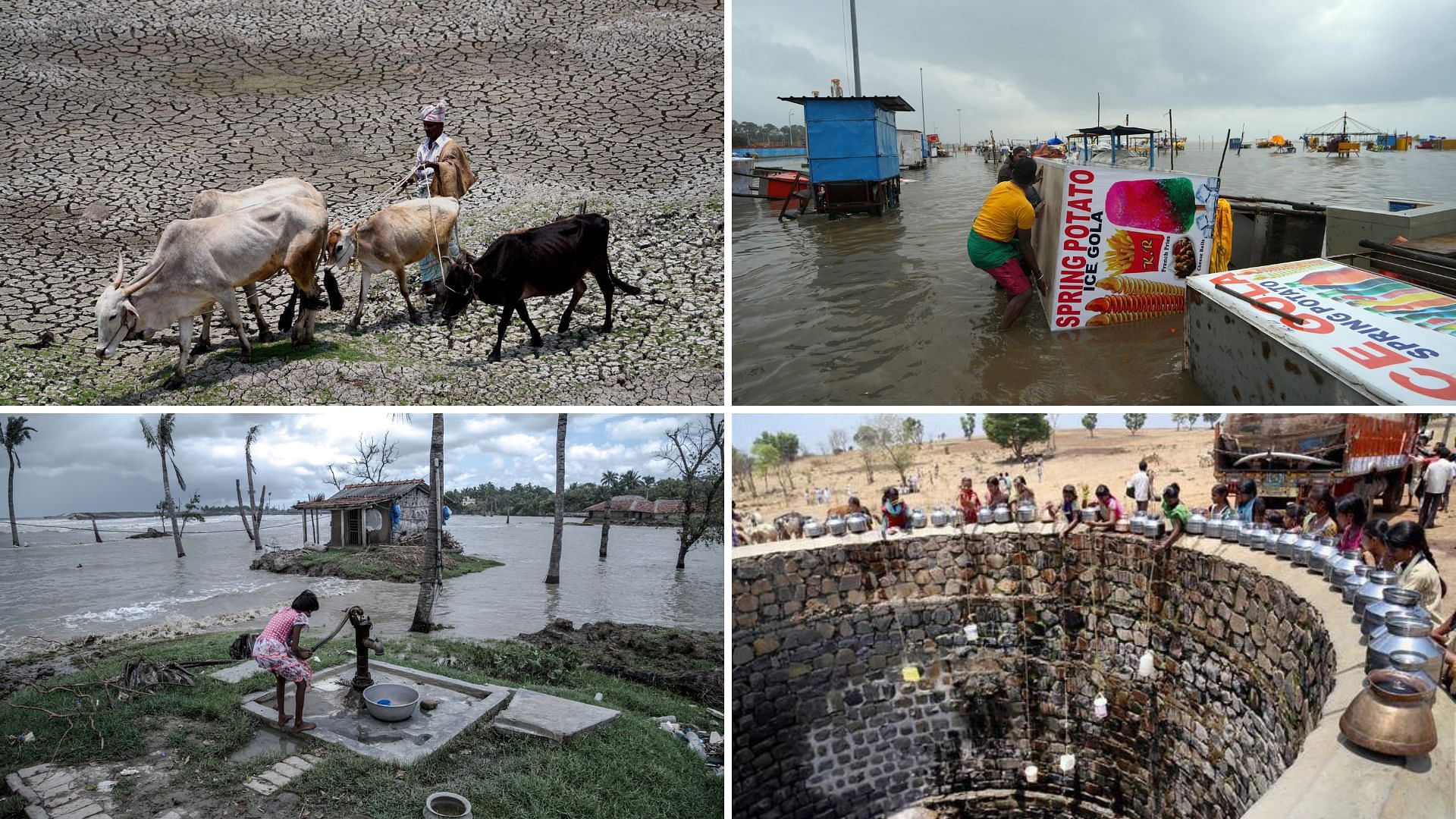Climate change that word is everywhere at the moment television documentaries podcasts conferences you name it. Our country has witnessed a deadly heatwave this year. The situation in Delhi NCR areas is so bad that people's ACs and cars are on fire.
India is witnessing a climate emergency. Don't think that only Delhi is in an emergency and if it rains after a few days, the situation will get better. Along with Delhi, the entire country is in an emergency. If Delhi is witnessing a heatwave, then coastal areas are being flooded, mountains are facing landslides and in western India, normal land is becoming barren. but what exactly it is? Is it the same thing as global warming? another word is often used well the two are used interchangeably but remember they're not the same.
What
is climate change?
Imagine
the Whole world as a giant building so global warming and climate change are
the two things happening in the building. Global warming happens when the whole
building starts to get warmer whereas climate change means that when various
floors of buildings experience different weather conditions such as one floor
starting to experience more heat another might get to experience more rainfall.
So, changes in weather conditions in different places around the world over a
long period say 30 years or more is climate change.
United
Nations describes climate change as Climate change refers to long-term shifts
in temperatures and weather patterns. Such shifts can be natural, due to
changes in the sun’s activity or due to the burning of fossil fuels like coal,
oil, and gas.
Causes
The reason we're talking about climate change is we are seeing climate change happen fast and scientists say it's going to speed up even more in the future why because of faster-than-usual global warming Around the late 70s people started using petrol and natural gas a lot during the Industrial Revolution this caused a spike in Carbon Dioxide(CO2) levels in our atmosphere in the 1950s that after World War II when we started using cars much more there was another spike in CO2 levels.
Also since
then, the world's population has tripled we are burning a lot more fossil fuels
releasing enormous amounts of CO2 so now when the sun's energy reaches the
Earth some of it is supposed to go back out into space but thanks to our gas
blanket CO2 methane the heat gets trapped in the Earth's atmosphere and causes
the average temperature to rise or global warming this is also called the greenhouse
effect again it does happen naturally as well this increase in CO2
and other greenhouse gases has caused the average global temperature to rise by
at least 1.1 degrees compared to
before the
industrial era.
Deforestation
and land use changes also play
a critical role in climate change. Forests act as carbon sinks, absorbing CO2
from the atmosphere. When forests are cleared for agriculture, logging, or
urban development, this carbon storage capability is lost, and the carbon
stored in trees is released back into the atmosphere, exacerbating the
greenhouse effect.
Industrial
processes including cement
production and chemical manufacturing, contribute to climate change by emitting
a variety of greenhouse gases, including CO2, methane, and nitrous oxide (N2O).
Nitrous oxide, often released from agricultural activities and the use of synthetic
fertilizers has a global warming potential much higher than CO2.
This rise
in global temperature has led to the melting of ice artic and this melted ice
turns black and absorbs more heat which makes it melt faster this melting ice
adds more water to the ocean
India is Burning: The Alarming Reality of Climate Change
India is currently experiencing the severe impacts of climate change, which are manifesting in various forms across the country. From unprecedented heatwaves to erratic rainfall patterns, the effects are both widespread and devastating, affecting millions of lives and the nation's economy.
Heatwaves and Rising Temperatures
In 2024, India has witnessed some of the most intense heatwaves in its history, with temperatures soaring above normal in many regions. The Indian Meteorological Department (IMD) has reported that in many parts of North India, the temperature reached 50 degrees Celsius. Cities like Bengaluru, which were believed to have good weather, have also crossed the temperature record.
According to IMD data, the average temperature in Bengaluru was between 33-35 degrees in May whereas this year, the temperature has reached 42 degrees. In Assam, where people didn't buy ACs, the condition has worsened so much that Assam's tea production has fallen due to this high temperature. Now, there's a reason behind this high temperature -- El Nino.
El Nino is a climate pattern This
El Nino is the reason why pre-monsoon showers have been delayed so much in
India. According to the World Meteorological Organization, El Nino's impact in
2023-2024 is on the record as one of the five strongest. In some areas, this
year, the maximum temperature has been 5-6.5 degrees higher than the average.
Water
Scarcity and Droughts
Water
scarcity has become a critical issue in India, exacerbated by erratic rainfall
patterns and prolonged droughts. The delayed and deficient monsoon rains have
led to severe water shortages in various states. For instance, regions that
heavily depend on monsoon rains for agriculture and drinking water are facing
dire consequences due to insufficient rainfall (mint)
Floods
and Extreme Rainfall
While some
regions face drought, others are dealing with the opposite extreme. Intense and
unseasonal rainfall has caused devastating floods in states like Assam, Bihar,
and Kerala. These floods have led to loss of life, displacement of communities,
and extensive damage to property and infrastructure. The erratic nature of the
monsoon, intensified by climate change, has made it difficult for these regions
to prepare for and mitigate the impacts of such disasters (Hindustan Times)
(mint).
Agricultural
Challenges
The
agricultural sector, which is the backbone of India's economy, is severely
affected by climate change. Unpredictable weather patterns, including
unseasonal rains and extended dry spells, have led to crop failures and reduced
yields. This not only affects food security but also drives economic
instability among farmers, many of whom are already struggling with debt. The
rise in temperatures and changing rainfall patterns are expected to continue
disrupting agricultural productivity, posing a threat to the livelihood of
millions (Hindustan Times) .
Impact
on Biodiversity and Ecosystems
India's
rich biodiversity is also under threat due to climate change. The rising
temperatures and altered precipitation patterns affect various ecosystems, from
the Himalayan glaciers to coastal regions. The retreat of glaciers is impacting
the water supply in northern India while rising sea levels and increased
cyclonic activity are threatening coastal habitats and marine life (mint) .
Solution
This
Climate change has impacted the overall economy of the country. Unsurprisingly,
many e-commerce companies, like Flipkart or Swiggy, are delivering their
products late because delivery workers do not want to work in the heat. Forget
about humans, even the ACs aren't working well. The power demand has increased
so much that the country doesn't have enough electricity and it's shedding
loads. We saw the same at Delhi airport. Here, the boarding and check-in
facilities were shut down because of this. Privileged people like me will
install another AC to fight the heat. But many people don't have this option.
What can we do?
The first
step towards it is acknowledging that yes there is a problem and working
towards it here, each one of us plays a crucial role in it. Media plays quite a
vital role although Indian media treat this problem as a fetched problem
treating the problem like this is not going to help we need to find
personalized solutions for the problem if we say the way we are living causing
floods in a certain area then that will not affect anyone we need to give more
direct impact of climate change such as the increase in electricity bills,
severe health issue such as heat strokes,


Post a Comment